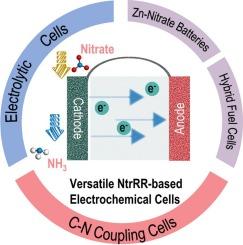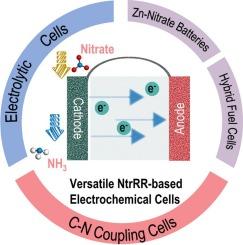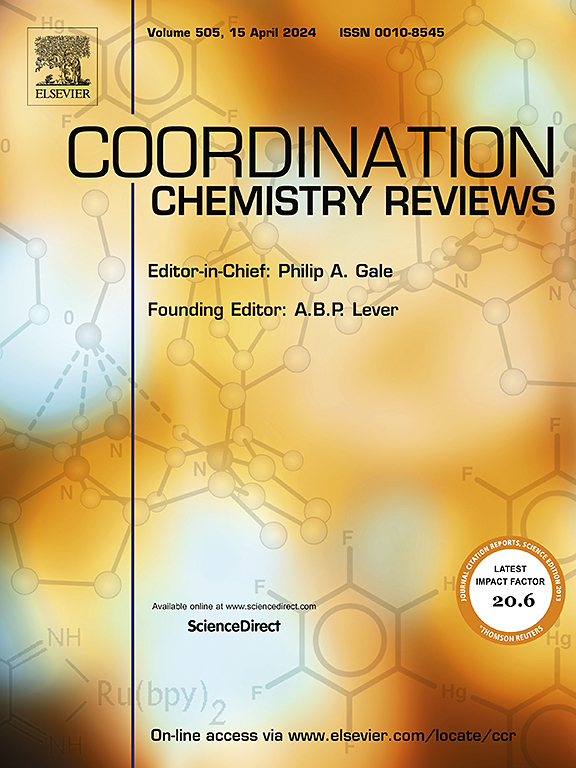基于硝酸还原反应的多功能电化学电池
IF 23.5
1区 化学
Q1 CHEMISTRY, INORGANIC & NUCLEAR
引用次数: 0
摘要
天然水体中硝酸盐的过量积累极大地扰乱了天然氮循环,危害人体健康。电催化降解技术是一种很有前途的方法,可以有效地去除硝酸盐,同时也可以构建电化学电池以实现附加值输出。本文综述了基于硝酸还原反应(NtrRR)的多用途电化学电池,重点介绍了先进电极的设计和电池结构的优化,包括硝酸锌电池、混合硝酸盐燃料电池、混合硝酸盐电解电池和CN偶联电池。介绍了NtrRR基本原理的全面概述,以及耦合NtrRR细胞的设计原则。最后,我们分析了主要挑战和未来前景,重点关注实际实现,机理理解,电催化剂设计和电池配置优化,以增强对涉及NtrRR的先进电化学电池的理解。本文章由计算机程序翻译,如有差异,请以英文原文为准。


Versatile electrochemical cells based on nitrate reduction reaction
The excessive accumulation of nitrate in natural water greatly disturbs the natural nitrogen cycle and endangers human health. Electrocatalytic degradation technology serves as a promising approach to efficiently remove nitrate while also enabling the construction of electrochemical cells for added value output. In this review, we provide an in-depth insight into versatile electrochemical cells based on the nitrate reduction reaction (NtrRR), focusing on the design of advanced electrodes and optimization of cell configurations, including Zn-nitrate batteries, hybrid nitrate fuel cells, hybrid nitrate electrolytic cells, and C![]() N coupling cells. A comprehensive overview of NtrRR fundamentals, along with the design principles of coupled NtrRR cells, is presented. Finally, we analyze the key challenges and future prospects, focusing on practical implementation, mechanistic understanding, electrocatalyst design, and cell configuration optimization, to enhance the understanding of advanced electrochemical cells involving NtrRR.
N coupling cells. A comprehensive overview of NtrRR fundamentals, along with the design principles of coupled NtrRR cells, is presented. Finally, we analyze the key challenges and future prospects, focusing on practical implementation, mechanistic understanding, electrocatalyst design, and cell configuration optimization, to enhance the understanding of advanced electrochemical cells involving NtrRR.
求助全文
通过发布文献求助,成功后即可免费获取论文全文。
去求助
来源期刊

Coordination Chemistry Reviews
化学-无机化学与核化学
CiteScore
34.30
自引率
5.30%
发文量
457
审稿时长
54 days
期刊介绍:
Coordination Chemistry Reviews offers rapid publication of review articles on current and significant topics in coordination chemistry, encompassing organometallic, supramolecular, theoretical, and bioinorganic chemistry. It also covers catalysis, materials chemistry, and metal-organic frameworks from a coordination chemistry perspective. Reviews summarize recent developments or discuss specific techniques, welcoming contributions from both established and emerging researchers.
The journal releases special issues on timely subjects, including those featuring contributions from specific regions or conferences. Occasional full-length book articles are also featured. Additionally, special volumes cover annual reviews of main group chemistry, transition metal group chemistry, and organometallic chemistry. These comprehensive reviews are vital resources for those engaged in coordination chemistry, further establishing Coordination Chemistry Reviews as a hub for insightful surveys in inorganic and physical inorganic chemistry.
 求助内容:
求助内容: 应助结果提醒方式:
应助结果提醒方式:


